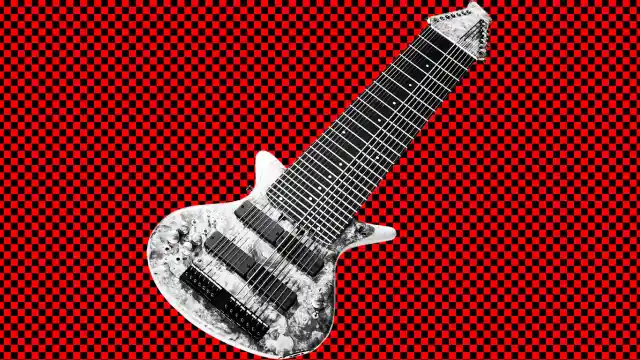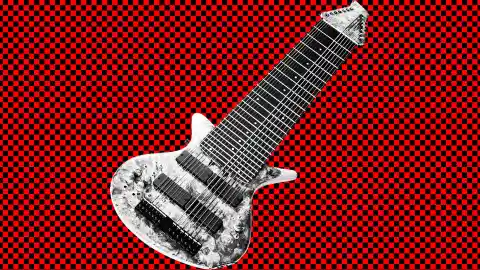

How much is too much? That is a question that has been asked since ages, but it is particularly applicable in the context of guitar strings. Bands have slowly been transitioning from 6 string guitars to 7/8 string guitars over the past few years. And when Schecter and Ibanez recently released their 9 string guitars at the recently concluded NAMM (National Association of Music Merchants) show, extended range guitars were thrust into the spotlight.
First of all, let me make it clear that when I talk about 7, 8 or 9 string guitars, I am speaking exclusively about extended range guitars and not cursed string guitars. A normal 6 string guitar’s standard tuning is E-A-D-G-B-E. Generally in such guitars, a ‘bass’ string (low b) is added but there are guitars with an added treble string (high a) too. Thus, the standard tuning of a 7 string guitar is B-E-A-D-G-B-E. Similarly, for an 8 string guitar the standard tuning is F#-B-E-A-D-G-B-E and so on and so forth. There are a lot of other boring things like baritone, string gauge, scale length, etc. involved, too.
But that is all technical and theoretical mumbo jumbo. And music, as we all know, is not technical and theoretical mumbo jumbo. A lot of jazz guitarists had played with the idea of an extended range guitar in the 70s and 80s, but it was Steve Vai who first used one on his 1990 album, Passion and Warfare. Other notable musicians like John Petrucci and Rob Beach used it sporadically. However, the 7 string guitar truly burst onto the limelight when Korn used one on their 1994 debut album. From there on, it gained some infamy and was associated with the nu-metal scene. Its true potential (in my opinion at least) however, was fully realized by Meshuggah. They utilized the complete range of notes and had such a lasting impact on bands that they spawned a completely new sub-genre that was named after the sound that the palm muted chords made: Djent.
Even though people may find the definition of the genre contentious, it is hard to argue that up until now, Djent and extended range guitars have gone hand in hand. Periphery guitarist Misha Mansoor was the first to popularize the term, and ever since then, it has caught on and is now used to describe a particular niche of modern, progressive metal. Bands like TesseracT, Monuments, Intervals, and Animals as Leaders use 7/8 string guitars as default. And to be fair to them, they do utilize the full range of notes on offer and don’t just play binary patterns on the lowest string. This is supported by the fact that not all their songs are on a 7 string guitar, and they only use one when the song demands it. Tosin Abasi is probably the craziest and most insane guitarist today and constantly tries to keep innovating, as evidenced by his use of the slap bass technique on the Animals as Leaders album, The Joy of Motion, released last year, which was highly acclaimed and lauded. After the Burial’s Justin Lowe shows us in this video that if played correctly, a 9 string guitar can sound amazing.
There are a lot of people who think that extended range guitars are useless because most bands don’t utilise them properly and keep saying “What’s the point of it? There are more than enough notes on a normal guitar so why not stick to that?” 7/8/9 string guitars offer more than just additional notes to play. They offer a more dynamic sound, the ability to experiment, additional unique tonal properties and the ability to experiment with complex scales and chords. Most of all, they offer a much fuller sound. A 7 string guitar allows you to play more complex ad heavier chords, while at the same time allowing you to solo effectively. An 8/9 string guitar on the other hand allows you to change the dynamics of the band’s sound, possibly even do away with the bass. A 9 string guitar can play notes with a lower register than a normal bass can. The sound of the bass is still there. It is just that instead of using a bass to produce that sound, a guitar is being used. So the role of the bass remains the same, it just gets transferred to the guitar. This is what Animals as Leaders have done by replacing the bassist with another guitarist. And a lot of the outrage also stems from the fact that we metalheads are resistant to change and look at anything new and different with suspicion. So the criticism against extended range guitars is more of a moral outrage than anything else.
Of course, there a lot of terrible bands out there who use extended range guitars; just like there a lot of terrible bands who use normal 6 string guitars. There are bands which use 9 and even 10 string guitars. Maybe it makes sense, maybe it doesn’t. But the fact remains that the role of the guitar is changing. Modern metal bands like Revocation are transitioning to 7 string guitars from 6 string ones. And it will be easier for all of us to embrace the change rather than resist it. Because at the end of the day the number of notes you play, or strings you use, doesn’t matter if the music touches you and moves you.